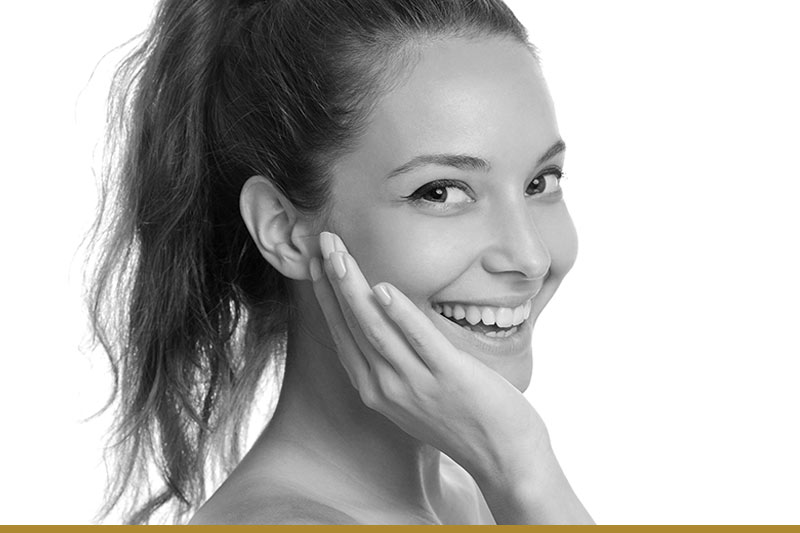Aging signs like fine lines and wrinkles, dry skin, decreased skin elasticity, and hair loss are also caused by changes in hormone levels. The good news is that you can rejuvenate your appearance with hormone replacement therapy.
This article explains which hormones make people look older and how anti-aging hormone therapy can help restore a youthful look.

Anti-aging hormone therapy is hormone replacement therapy (HRT) that improves the levels of those hormones which cause aging signs. Certain hormonal shifts accelerate the aging process and manifest as:
HRT is usually administered to women in menopause and men in andropause.
Hormone replacement therapy can reverse aging signs by increasing epidermal hydration, stimulating the production of collagen and elastin, improving skin elasticity and thickness, and reducing fine lines and wrinkles.
Improved hormonal levels can also increase energy and alleviate mood swings, making you feel younger.
Hormone replacement therapy can be given as a pill, injection, or topical product. The treatment often includes a combination of different hormones, depending on which hormones the patient lacks or has in excess. The medical provider takes a blood test and assesses the patient’s hormonal status to create a comprehensive and targeted HRT treatment plan.
Our medical professionals at the Vibrant Vitality Clinic use specially formulated bioidentical combinations in their anti-aging hormone replacement treatments to address each patient’s specific health issues and skin concerns.
The following hormones are usually used in anti-aging hormone replacement therapy.
Estrogen is responsible for the functioning of our metabolism, muscle growth, energy levels, skin, nails, and hair. It’s generally considered a female hormone but is also present in low amounts in men.
Estrogen has over 400 functions in women’s bodies, and its deficiency can trigger numerous health conditions and accelerate aging.
In skin physiology, estrogen regulates:
Women typically experience estrogen deficiency in menopause. Lower levels of this hormone lead to thinning, sagging, and dryness of skin, more pronounced wrinkles, and pigmentation issues.
Female hormone replacement therapy balances estrogen levels and restores the hormone’s functions, preventing or reversing aging signs.
Progesterone is a “female” hormone involved in regulating the menstrual cycle and supporting pregnancy. It is also present in men to a lesser degree.
Women experience progesterone fluctuations throughout life, with levels rising around ovulation and falling if the egg remains unfertilized. Prolonged progesterone deficiency leads to high cortisol and low estrogen. The resulting disbalance increases aging signs such as wrinkles, dry and sagging skin. Excessive levels of progesterone can cause sebum build-up and breakouts.
Anti-aging hormone treatments help balance progesterone levels, alleviating aging symptoms.
Like estrogen, testosterone regulates numerous bodily functions. In skin physiology, testosterone affects collagen and sebum production and, consequently, skin thickness and moisture levels. Loss of testosterone leads to dry and thinning skin, while excessive testosterone production can cause acne.
In menopause, women experience a rise in testosterone levels and a drop in estrogen, while men experience the reverse. Testosterone replacement therapies can help both men and women achieve optimal levels of this hormone.
Note: Learn more about what is Testosterone therapy and how does it work in our detailed article.
HGH is usually used for treating dwarfism in children because it is responsible for muscle and bone growth.
Its levels decrease with age, causing aging signs such as wrinkles, thinning lips, and joint pain. Medical professionals recommend boosting HGH levels with exercise, a protein-rich diet, and getting enough sleep. Patients with human growth hormone deficiency can also benefit from HGH injections.
Cortisol is a stress hormone produced by the adrenal glands. People who go through prolonged periods of stress can also experience cortisol-induced collagen loss, resulting in dull, sagging skin. Cortisol levels can be regulated with anti-aging HRT treatments, resulting in a slowing down of skin aging.
Hormone replacement therapy positively affects our appearance because it helps prevent or reverse the signs of aging.
Consult an experienced medical professional before seeking hormone replacement therapy to learn which hormones you need to supplement to look and feel better.




4325 E Indian School Rd, Suite 130
Phoenix, AZ 85018
United States
(480) 422-2058
info@vibrantvitalityclinic.com
Monday - Friday: 9:00 am - 6:00 pm
Saturday: 9:00 am - 3:00 pm
Sunday: Closed
